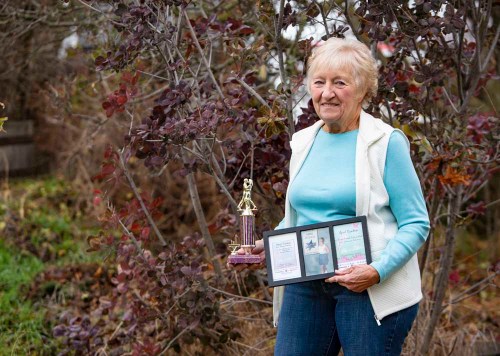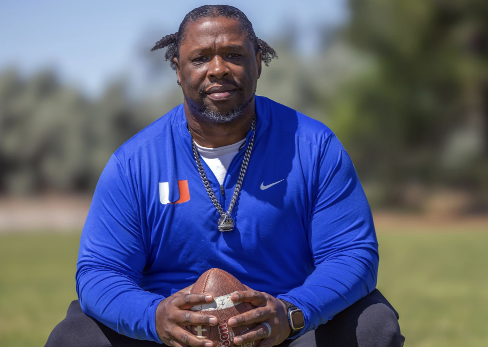Dancer finds satisfaction in teaching others, even lost causes
Published 3:00 pm Thursday, November 4, 2021

- Dance instructor April Dyntera poses for a portrait Wednesday, Nov. 3, 2021, in the garden of her Adams home alongside a trophy from the Seaside Jack and Jill Dance Contest and a certificate from the Portland Dance Festival. Dyntera is teaching a dance class Nov. 6 and 20 in Hermiston.
HERMISTON — During the pandemic, when dance opportunities can be few and far between, April Dyntera is helping people learn to dance.
The Adams resident and dance instructor said she wants people to be ready for when there are more chances — more weddings, more parties and so on.
Dyntera is teaching two classes for the Hermiston Parks and Recreation Department at The Arc Building, 215 W. Orchard Ave., Hermiston. “Learn to Dance with April! East Coast Swing and Nightclub 2 Step,” is on Saturdays, Nov. 6 and 20, 10 a.m. to noon.
Her own history with dance came in her youth. When she was in the fifth grade, her grandmother pushed her dinner table to the side to make room for dancing. There, her uncle, who was three years older than she, taught her swing.
She said she liked the experience. A music lover, Dyntera responded naturally, but it took some time, she said, to understand what it was she was doing.
Dyntera, 74, did not begin training seriously in dance until 1991, when a friend invited her to a line dancing class because he did not want to go alone. After one lesson, he did not want to go back. She, in contrast, did not want to leave.
Dyntera, then in her 40s, had finally “found her niche,” she said, adding the dance lessons and the feeling they created in her were “electric” and filled a void.
She practiced and she got better. And she learned she could keep getting better.
“It’s a path with no end,” she said of dancing.
No matter how good she got, or how great she becomes, there always is room for improvement. For years, she kept taking lessons from different instructors, attending workshops and attending seminars. In 1994, she moved to Pendleton, but would still drive to Portland to attend classes.
“I think you should take lessons from as many instructors as you can because each instructor has a different approach and specialty,” she said.
During her early years, her ambition was to be the best she could be and learn as much as she could. Also, she wanted to compete in a dance competition and perform publicly, she said.
She attained her competition goal at a Portland dance festival around 1996, as she competed in three line dances and took first in each. She followed that up with another competition soon after when she won got second in a line dance.
In the mid-90s, she started teaching a class at Crabby’s Underground & Saloon, Pendleton. This was her first teaching gig, giving hour-long lessons to students before the band started playing. She has since offered classes with groups, including the parks and recreation departments for Hermiston and Pendleton and the Pendleton Eagles Lodge. She also gives seminars and offers private and semi-private lessons.
Though she has won her own competitions, she said her greatest and most satisfying accomplishment is teaching. She loves it when she can sit back and watch couples, whom she has taught, dance.
Confidence makes dancing fun, she said, and one gains confidence through practice. Expertise leads to relaxation, which leads to the proper dancer’s mindset she said. So even when a dancer makes a mistake, the mistake can be laughed off. One only needs to start again.
This is an analogy for life, she said. You get up and start again.
Dyntera speaks so much wisdom in her lessons, as with her analogy between life and dancing, people tell her she should be a marriage counselor.
A retired counseling secretary for Oregon Public Schools, she laughs off the idea of being a counselor. Her wish, rather, is to be a dance teacher, a job she is presently enjoying.
One of her favorite things about teaching is discovering people who think they cannot dance. Often, these people have even taken lessons elsewhere, but failed to gain any ability.
“I like lost causes,” Dyntera said.
Often, she said, she has been able to help such lost cases learn how to dance by first teaching them what to listen for in music. There are few people — maybe one or two in her years of teaching — who are fully tone deaf and unable to hear a melody, but nearly everyone else can learn to dance.
Dyntera has even taught a person in a wheelchair to dance, by choreographing a cha-cha.
Now well experienced in both dance and teaching, she said she is still working toward mastery. She knows several dances, though, including six count, east coast swing, nightclub two-step, west coast swing, salsa, rhumba, Arizona two-step, country western two-step, line dancing, foxtrot, waltz, cha-cha and country couples pattern dancing, she said.
Though she knows many dances and has experience in each, Dyntera said she is excited to continue learning more. This is her passion, and she is happy to partake in it.









